Who's 'Most to Blame' for Global Warming?

(Getty Images)
The USA - by a Long Shot
5 simple graphs show it - undisputed bedrock facts for any solution.
Nature's Edge Notebook #33
Observation, Analysis, Reflection, New Questions
-------
Who's most to blame for global warming?
Nobody meant it to happen.
But it has, and there's no debate among the world's scientists about which country is "most responsible." That is, about which nation has injected the greatest amount of the heat-trapping invisible gas CO2 into to the atmosphere, where a lot of it remains for years, piling up and only adding to the heat.
The answer: United States has, with China a distant second.
And figured on a per person basis, the "most responsible" is the United Kingdom, with the United States a close second, Germany a close third, and China a distant seventh.
If you're surprised the "most to blame" isn't China, the explanation is simple:
In about 2007, China did pass the United States in putting the greatest amount of CO2 into the air per year , but China's economic boom only got started recently and they still have a couple of decades to go (if there are no drastic changes) before they catch up with the United States in the total cumulative amount of heat-trapping CO2 they will have been piling up in the air.
(Regarding the per person way of thinking, the United Kingdom's population is about 62 million, America's is just over 310 million, Germany's about 82 million, and China's about 1.4 billion.)
The graphs below from NASA show all this responsibility in simple form. Most 12-year-olds understand them in a matter of minutes.
(And as reported in our previous Nature's Edge Notebook and as is now taught in many middle schools around the world - there is no debate among the world's climate scientists that human emissions are causing the increasing global heat, nor that these emissions are the direct overall cause of the rapidly increasing frequency of heatwaves, drought and flood … and thus of the crippled agriculture and suffering those things are already bringing more frequently in various parts of the world - this year, notably, in the United States.)
Actually, this is old news.
The world's climate scientists have been in clear agreement about it for years.
Nobody Meant This to Happen, But Now That We Understand…
Global warming was not expected to be a result of the industrial revolution and of the current fossil fuel based, electricity dependent civilization it led to.
(The great majority of the world's electricity is generated by burning coal, which pours heat-trapping CO2 into the air.)
But now we know it is the result.
So the question of who - which nations or people - are "most responsible" is an inevitable and important part of negotiations about how to deal with it.
Obviously, it has inescapable moral implications, including in the fact that many who suffer most from it - in poorer countries - are often those who put by far the least CO2 into the air.
It may of course help, when looking at these graphs showing "who's most responsible," to remember that nobody meant this to happen.
But it has long been impossible for any nation - or any multi-national corporation - to go on emitting greenhouse gases without being aware of the general consequences.
(This reporter has not yet found any credible comparisons that may exist assessing which multinational corporations may be "most to blame" or most responsible for cumulative and lingering emissions, though if such comparison are indeed even possible, they might help indicate some aspects of how negotiators might seek to apportion responsibility.)
Four Simple Facts (And graphs) Showing Who's Most Responsible
Simple fact #1:
A significant portion of the heat-trapping CO2 humans put into the air stays there for years - some for 100 years, and even much longer.
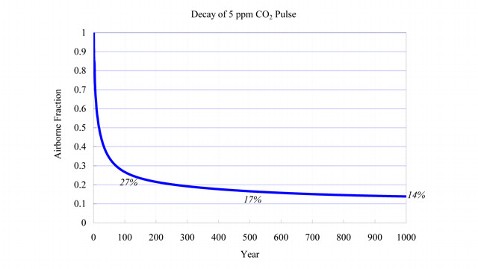
Note that, after falling out of the atmosphere quickly during the first 50 years to about a third, the "decay" of the CO2 emissions slows dramatically.
Twenty-seven percent of it is still up there after 100 years, 17 percent after 500 years, and 14 percent after 1000 years.
This "decay," say the scientists, is due to the fact that, over time, some of the excess CO2 in the air is taken up by plants and absorbed into the soil, and some absorbed into seawater (which causes a second great problem, the growing acidification of the oceans.)
Scientists, including those at NASA's Goddard Institute for Space Studies, have determined that - as its widely respected longtime Director James Hansen tells ABC News - "climate change is proportional to the cumulative emissions."
In other words, the build-up of global warming over the past couple of centuries has increased at rates directly proportional to the total amount of emissions that humans have been putting into the air… even though some of those emissions are eventually absorbed back out of the air.
Simple fact #2:
The nation that has put biggest cumulative portion of CO2 into the air, thus helping heat the planet, is the USA.
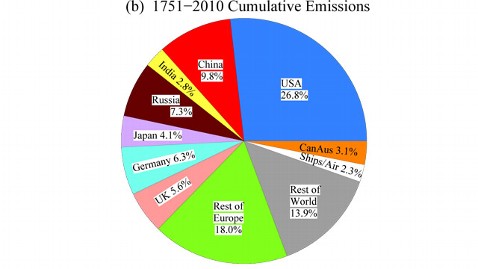
Note that China, India, Russia, Japan, Germany, and the UK are each a small fraction of the US … in total cumulative emissions.
Simple - and surprising - fact #3:
On a per capita basis, the biggest portion of cumulative CO2 heating the planet was emitted not by the United States, but by the United Kingdom.
That's partly because the United Kingdom created the "industrial revolution" around the year 1800, first by burning enormous amounts of coal.
The UK led that revolution for so long that, on a per person basis, it is still the "most responsible" for the world's excess heat now and in the near future, with Americans a close second and Germans a close third.
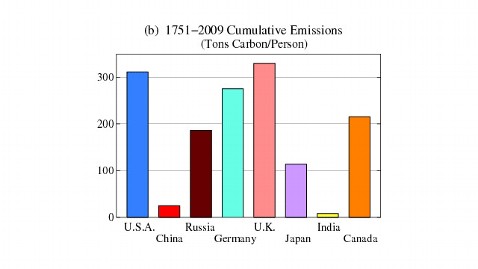
Note that per person, the United States is a close second and Germany, whose industrial activity (as shown in this next graph) started before that in the United States, a close third, and they are followed by the more distant Canada, Russia and Japan. China is a distant seventh.
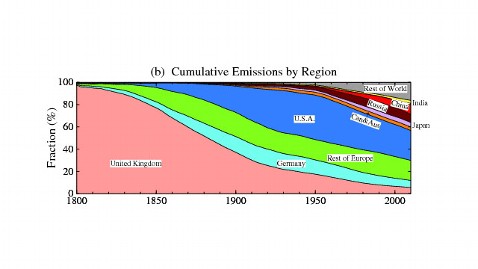
Simple fact #4 (to clarify any confusion about China's role):
China's economic boom only got going recently, and only started producing more CO2 emissions per year than the United States in about 2007.
That's why its cumulative contribution to the heat-trapping greenhouse gases is still a distant second to that of the United States. At current rates, China won't catch up to the United States for a couple of decades.
In the single year of 2010, China's total emissions (23.9 percent of the world's emissions) exceeded America's (which were 17.2 percent).
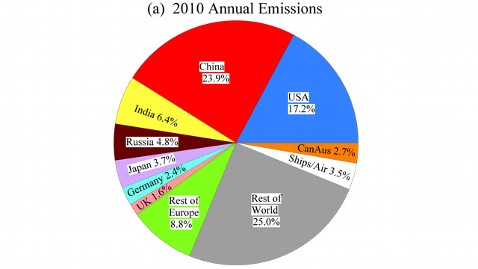
-------
One more simple fact - one that bears deeply on all negotiations about how to deal with this global crisis.
There are no borders in the world's constantly swirling atmosphere, nor in the ocean's many globe-girdling "conveyor belt" currents.
Any heat-trapping and ocean-acidifying CO2 gets pretty well mixed in everywhere soon after it is emitted, whatever and wherever the source.
The damage so far - and for the next couple of decades (during which the heat is expected to keep rising, regardless of what nations agree to do) - will have been done more by the United States than by any other nation.
But this is not, in the impression of this reporter, the main reason the countries of the world have been hoping Washington will take the lead in dealing with it.
Government leaders in Europe, China, India, Russia, the Middle East, Africa and Latin America have for many years expressed hope that the United States would become the global leader in forging binding agreements to drastically cut the heat-trapping CO2 emissions worldwide.
They apparently have done so mainly because they feel that the single greatest superpower would be able to set the tone, not only because the United States is "most to blame" in the sense of having put the single largest amount of CO2 up there.
But the fact of America having emitted the most is still a major factor in the diplomatic requests for the US to take the lead.
Especially in the absence of global leadership from the United States on this matter, this hard and undisputed fact of which nation is "most to blame" seems to many observers likely to be increasingly an issue in negotiations as the effects of manmade global warming grow worse.
------
We invite you to follow our weekly Nature's Edge Notebook on Facebook and on Twitter @BBlakemoreABC
Find more on our Nature's Edge website at www.abcnews.com/naturesedge